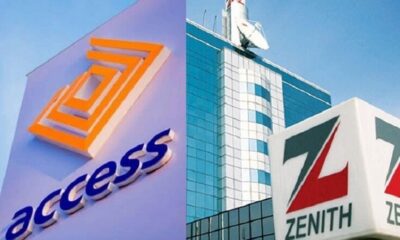Money market
Zenith bank records highest YoY pre-tax profit growth for 2023 nine months results in Nigeria
Zenith Bank, one of Nigeria’s leading financial institutions, has reported impressive financial results for the first nine months of 2023.
The bank recorded a remarkable pre-tax profit growth of 149.05 percent year-over-year, reaching a total of N505.036 billion.
This figure represents the highest pre-tax profit in Nigeria for this period.
One of the key factors contributing to this outstanding performance was the significant foreign exchange gains resulting from the devaluation of the Naira.
The Naira’s value decreased from N461.1/$ at the end of 2022 to N776.8/$ by September 2023. This devaluation led to substantial gains for Zenith Bank, with foreign exchange gains amounting to N378.122 billion over the nine-month period.
Notably, in the second quarter alone, the bank recorded foreign exchange gains of N354.376 billion.
However, the bank experienced a decrease in foreign exchange gains in the third quarter, amounting to N22.534 billion.
Despite this moderation, the overall performance for the nine-month period remained impressive.While the second quarter saw peak quarterly gross earnings and post-tax profit, contributing significantly to the bank’s overall performance, there are other factors to consider.
Zenith Bank’s success can also be attributed to its strong management, efficient operations, and strategic decision-making.
The bank’s exceptional financial results highlight its ability to navigate the challenging economic landscape and capitalise on opportunities.
Zenith Bank continues to demonstrate its position as a leading player in the Nigerian banking sector, delivering value to its shareholders and contributing to the country’s economic growth.
Interest income increased by 72 percent to N670.932 billion, but interest expenses grew more sharply by 137 percent to N255.704 billion.
Zenith Bank also provided some context to their recent earnings explaining that it was largely due to new loans as well as forex revaluation.
“The growth in profit similarly is attributable to the twin effects of the improvement in interest and non-interest income. Interest income increased because of the growth in risk assets as well as the effective pricing thereon. The non-interest income growth is largely driven by the revaluation gain due to the unification of exchange rates during the year.”
Despite this, net interest income rose by 47 percent to N415.228 billion. However, a 16.51 percent decline in net interest income after impairment charges and a 10 percent drop in net interest margin to 5.6 percent were noted.
A spike in loan impairment charges to N209.999 billion, a 466 percent year-on-year increase, significantly affected the cost of risk, which jumped by 323 percent to 5.5 percent, indicating higher credit risk and impacting the net interest income margin.
The bank explained that the rising loan impairment was strategic as it preferred to take the hit on loan losses now that profits are at all-time highs.
“Impairment levels increased due to the deliberate incremental provisions necessitated by our conservative approach towards the heightened risk environment and the creation of a counter-cyclical buffer needed to deal with any impending volatility of exchange rates.
“This caused the cost of risk to deteriorate from 1.3 percent in Q3 2022 to 5.5% in Q3 2023, however, this is an improvement from Q2 2023 where cost of risk printed at 8.8 percent because of prudent management of our risk assets.”
However, Zenith Bank’s effective credit quality management also seems to be working as evidenced in the reduced non-performing loan ratio to 3.8 percent and a substantial decline in loan impairment charges in Q3 to N2 million.
Additionally, the bank demonstrated strong shareholder returns, with a 95 percent growth in return on average equity to 35.1% and a return on average assets of 3.5 percent.
These figures highlight the bank’s efficiency in profit generation from shareholders’ funds and assets.
Operational expenses were well-managed, evidenced by a 32 percent year-on-year decrease in the cost-to-income ratio to 37.8 percent. This control is crucial for sustaining favourable returns to shareholders.
Zenith Bank’s earnings per share (EPS) saw significant growth, reaching N13.82 for the nine months, a 149.05 percent increase year-on-year, and a trailing twelve-month EPS of N14.17.
Q3 alone registered an EPS of N3.29, marking a 107 percent growth over the period. With a year-to-date share price gain of 38.73 percent, earnings outpace the share price, driving its upward trend.
The Central Bank of Nigeria’s directive limiting the use of FX gains for dividends and expenses tempers expectations for higher returns in 2023. Still, Zenith Bank’s solid dividend history and an interim dividend of N0.50 for H1 2023 keep investor interest alive.
Currently, Zenith Bank’s stock offers an attractive dividend yield of 10.21% and the highest EPS among the five Tier-1 banks.
Its trailing twelve-month P/E of 2.16x is below the Tier-1 banks’ average of 2.37x, and a price-to-sales ratio of 0.83 suggests a market perception of undervaluation.
Despite these promising valuation metrics, reversing the decline in net interest income remains crucial for Zenith Bank, especially as FX gains, a key bottom-line driver in 2023, diminish.
Money market
Nigeria’s inflation rate rises to 33.69% in April 2024


In April 2024, the headline inflation rate rose to 33.69 percent, up from 33.20 percent in March 2024, marking an increase of 0.49 percent points according to the Nigeria Bureau of Statistics (NBS).
Comparing year-on-year data, the inflation rate in April 2024 was 11.47 percent points higher than in April 2023, where it stood at 22.22 percent. This indicates that the headline inflation rate has risen significantly over the past year.
Additionally, on a month-to-month basis, the inflation rate for April 2024 was 2.29 percent, which is 0.73 percent lower than the 3.02 percent recorded in March 2024. This suggests that the rate at which prices increased in April 2024 was slower than the rate in March 2024.
In April 2024, the food inflation rate reached 40.53 percent on a year-on-year basis, marking a substantial increase of 15.92 percentage points from the 24.61 percent recorded in April 2023. This significant rise in food inflation can be attributed to higher prices for several items including millet flour, garri, bread, prepacked wheat flour, and semovita, all of which belong to the Bread and Cereals class, as well as for yam tuber, water yam, and cocoyam and others.
For the year ending in April 2024, the average annual rate of food inflation stood at 32.74 percent, representing an increase of 9.52 percentage points over the 23.22 percent average annual rate recorded in April 2023.
Core inflation, which excludes the prices of volatile agricultural products and energy, reached 26.84 percent in April 2024 on a year-on-year basis, an increase of 6.87 percent from the 19.96 percent recorded in April 2023. The most significant price rises were observed in actual and imputed rentals for housing, motorcycle journeys, bus journeys within a city (under Passenger Transport by Road Class), consultation fees for medical doctors, X-ray photography (under Medical Services Class), and accommodation services.
On a month-on-month basis, the core inflation rate was 2.20 percent in April 2024, down from 2.54 percent in March 2024, representing a decrease of 0.34 percent. The average annual core inflation rate for the twelve months ending in April 2024 was 22.84 percent, which is 5.15 percentage points higher than the 17.70 percent recorded in April 2023.
In April 2024, the urban inflation rate on a year-on-year basis reached 36.00 percent, which is 12.61 percentage points higher than the 23.39 percent recorded in April 2023. On a month-on-month basis, the urban inflation rate for April 2024 was 2.67 percent, showing a decrease of 0.50 percentage points from the 3.17 percent seen in March 2024. The average urban inflation rate over the twelve months ending in April 2024 was 30.02 percent, marking an increase of 8.53 percentage points from the 21.50 percent reported in April 2023.
In April 2024, the rural inflation rate was 31.64 percent on a year-on-year basis, which is 10.50 percentage points higher than the 21.14 percent seen in April 2023.
On a month-on-month basis, the rural inflation rate for April 2024 was 1.92 percent, a decrease of 0.95 percentage points from the 2.87 percent recorded in March 2024. The average rural inflation rate over the twelve months ending in April 2024 was 26.38 percent, which represents an increase of 6.20 percentage points from the 20.18 percent reported in April 2023.
Money market
Governor Sule woos investors to invest in Nasarawa, assures of inclusive economy


…Counts gains of previous edition of investment summit
By Matthew Denis, Lafia
The Governor of Nasarawa state, Engr. Abdullahi Sule has taken steps to woo investors to invest in the state at the ongoing Nasarawa Investment Summit.
Delivering his opening speech, Governor Sule disclosed that the state is expanding the existing industrial, agricultural and mining sectors towards a better economy.
He said, “What we are witnessing today will further expand our existing pathways to leverage on the industrial, agricultural and mining sectors towards enhancing inclusive and sustainable wealth creation and economic prosperity.
“It is with a sense of fulfillment and responsibility that I address you today on the occasion of the Nasarawa Investment Summit, 2024.
“I must acknowledge our most cherished investors and other development partners, who are here to be part of this auspicious occasion. I have no doubt that the coming together of these distinguished and eminent personalities will, no doubt offer us the opportunities to continue to map the future of our State economic landscape in our relentless commitment to explore business opportunities and forge investment partnerships across business endeavour.”
The Governor stressed that it is pertinent to remind you that Nasarawa State organised the first edition of the Nasarawa Investment Summit in 2022 under the theme “Diamond in the Rough: The Making of a New Investment Frontier,” aimed at ushering investment and showcasing our mineral resources to potential investors.
“I am happy to state that the outcome of the Summit informed the influx of investors into the State Who are variously harnessing our God-given endowment.
“Interestingly, the recently commissioned Avatar New Energy Materials Company Limited in Nasarawa State performed by Mr. President, the ASGARD Mining and Processing Plant, Karu, the Nasarawa Technology Village Project in Karu, as well as other numerous investments being carried out in the State were all informed by the outcome of the Summit conducted in 2022.
“It is also heartwarming to state that the Federal Government commissioned the spud-in of the Ebenyi-A Oil Well in Obi Local Government Area of the State. The discovery of Oil and Gas and its subsequent exploration and exploitation will further boost the economic prosperity of our dear country and put Nasarawa State among the comity of Oil producing States.
“I, therefore, call on the investors on Oil and Gas to take advantage of the exploration activities to begin to invest in the sector for the benefit of the society.”
“To ensure full utilisation of our potentials, we have pledged to sustain the Investment Summit in order to further showcase other solid mineral resources which are yet to be identified by interested investors. This is why the theme of this year’s Summit is deliberately coined as ‘The Industrial Renaissance,’ having built some of the key fundamentals required to drive our industrial agenda and present other minerals to our potential investors.”
He explained that the staging of the 2024 Nasarawa Investment Summit,which we are witnessing today will further expand our existing pathways to leverage on the industrial, agricultural and mining sectors towards enhancing inclusive and sustainable wealth creation and economic prosperity.
“It is pertinent to point out that, as a State, we have been deliberate in stimulating our economy, building human capacities, creating wealth and generate employment to our people. It is for this reason that we have adopted our policy document christened ‘Nasarawa Economic Development Strategy (NEDS)’ as a driving force towards the initiation and implementation of various programmes and policies which we have achieved so far.
“I must acknowledge that with the assemblage of the experienced and versatile resource persons to engage the participants on the topics earmarked for discussion, I believe that the outcome of this Summit will go a long way towards actualizing our dream of industrialising Nasarawa State and position it as a leading champion.”
While applauding President Bola Ahmed Tinubu for his sustained effort in driving the Nigeria economy to prosperity, he said, “I assure Mr. President of our unalloyed loyalty and continued support in order to take our country to greater heights.”
“Let me as always, call on our development partners to continue to invest in Nasarawa State with the view to open the frontiers of economic prosperity for the benefit of all. Indeed, Nasarawa means business.”
Money market
CBN launches strategy to double remittances, grants AIP to 14 new IMTOs


The Central Bank of Nigeria (CBN) has activated plans to double foreign-currency remittance flows through formal channels by granting 14 new International Money Transfer Operators (IMTOs) Approval-in-Principle (AIP).
-
Finance4 months ago
Court orders Sen. Victor Umeh to repay N136m bank debt to AMCON
-



 Abuja Update3 months ago
Abuja Update3 months agoUNDP, FG partnership needed to achieve inclusion, equity- Minister
-
capital market2 years ago
Rt.briscoe, FBNH, Others halts negative performance of stock market
-
Abuja Update2 months ago
Banks drive stock market performance with N147bn gain
-



 Health1 month ago
Health1 month agoCapacity training will reduce migration of health workers- NPHCDA
-
Submission Guidelines4 months ago
CALL FOR SUBMISSIONS: POETRY COLUMN-NND
-



 Business4 weeks ago
Business4 weeks agoTingo Group unveils Tingo Electric, Tingo Cola drink at Lagos launch
-
News4 months ago
Oil thieves sponsoring malicious media campaign against Navy – Spokesman












